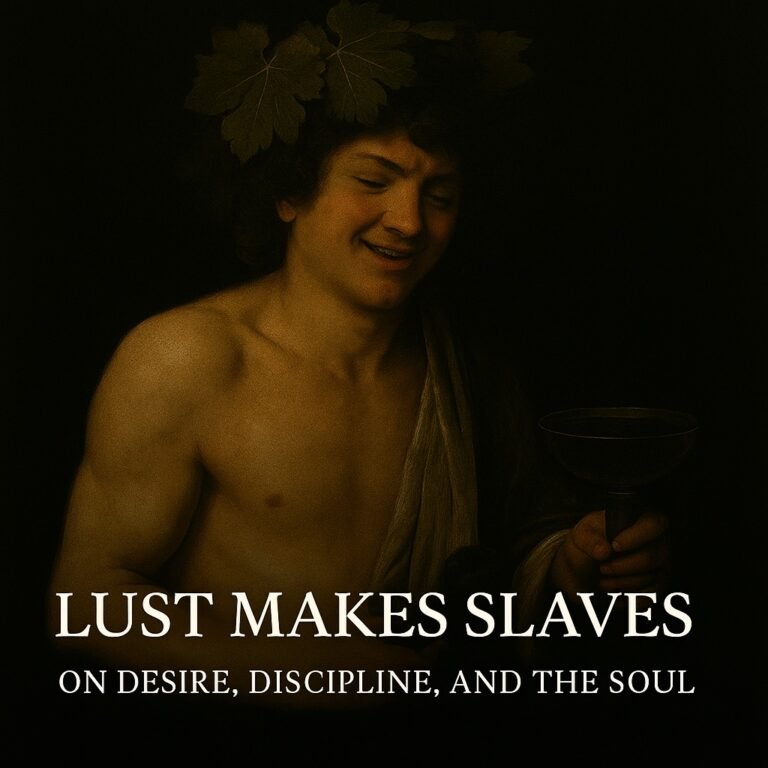
A man addicted to lust is not free. He laughs on the way down, calling it pleasure, while the chains are fastened by his own hands. Lust promises relief and delivers rot. It hollows the will, fogs the mind, poisons the soul. If a man cannot master himself, he is not fit to master anything. And yet, when desire is mastered, the soul sharpens, the will hardens, and the body becomes an ally instead of a prison.
This isn’t just moral poetry. It’s also mechanics, how the brain wires, how habits form, how self-control is built, and what actually helps people recover.
I. Why Lust Feels Like It Owns You
Addictive cycles hijack the brain’s reward circuit. Large, fast reward signals (dopamine surges) teach the brain that the quickest route to relief is the compulsive behavior, pushing aside healthier goals. Over time, cues (time of day, device, mood) start triggering craving on their own, even without the stimulus present. That’s why “I didn’t even want to, but I did” is a real experience, not an excuse.
The World Health Organization classifies Compulsive Sexual Behavior Disorder (CSBD) in ICD-11, not as a substance or gambling addiction, but as an impulse-control disorder with persistent, distressing loss of control over sexual urges/behaviors that cause harm. Translation: whether you call it “addiction” or not, the recognized pattern is real and treatable.
Problematic pornography use, specifically, has been repeatedly linked, especially in longitudinal work, to psychological distress (anxiety, depression) and tends to remain stable over time without intervention. That stability is the trap: the cycle doesn’t magically unwind; it digs in.
II. Pleasure vs. Decay: What Compulsion Does to the Person
- Willpower erosion: Repetition under high reward narrows attention to the quickest relief; long-term goals dim. This is the very definition of being ruled rather than ruling.
- Mood & meaning: Compulsion correlates with more distress over time. You chase stimulation while joy thins out; novelty must escalate to hit the same relief.
- Isolation & secrecy: Shame grows, honesty shrinks. The self splits: public image vs. private loop. That split is where rot spreads.
Spiritual language says “the soul decays.” Psychology would say values are betrayed and agency weakens. Both are naming the same phenomenon.
III. “Master Yourself” Isn’t a Slogan—It’s a Protocol
1) Treat it like a real disorder, not a moral quirk.
Evidence-informed care for CSBD/PPU centers on Cognitive Behavioral Therapy (CBT) and Acceptance & Commitment Therapy (ACT). CBT targets triggers, distorted beliefs, and behavioral loops; ACT builds willingness to feel urges without acting and re-anchors life in values-based action.
2) Build skill, not just “try harder.”
Pure white-knuckle “willpower” is brittle. Modern self-control research has moved beyond the old, simplistic “ego depletion = empty battery” model toward strategic conservation and skills (friction design, cue control, pre-commitment). In practice: design your environment so the easiest action is the right one.
3) Reshape the habit loop (it actually takes longer than you think).
Habit formation data show a median ~66 days to automaticity, with wide ranges. Expect months, not weeks. Track streaks, but obsess over systems, same cue, same replacement behavior, same reward.
4) Build a Values Spine (ACT tool).
When an urge hits, ask: What would the future me, loyal to my values, do right now? Practice urge-surfing (let the wave rise, peak, fall) while taking one small, values-aligned action—message an accountability partner, step outside, journal 5 minutes on “Who am I choosing to be?”
5) Clinician + Community + Containment.
Best outcomes usually combine:
- Therapy (CBT/ACT with a CSBD-literate clinician),
- Medication when needed (e.g., to address co-occurring depression/anxiety),
- Peer groups (e.g., SAA or therapist-led groups) for shame reduction and accountability.
IV. A Man’s Manual: 12 Moves to Turn Body from Jailor to Ally
- Purge the pipeline. Blockers, DNS filters, app limits, and “dumb times” on phone/PC. Make the wrong thing harder and the right thing closer.
- Map your triggers. HALT (Hungry, Angry, Lonely, Tired) + specific cues (time, location, device, emotion). Write your top five; post the list; plan counters.
- Replacement rituals. When the cue fires, move your body (10 push-ups, cold water on face, walk outside), then 90 seconds of box breathing. This resets arousal and buys choice.
- Urge-surf (ACT). Name the urge, locate it in the body, breathe through it for 2–3 minutes while doing something aligned with your values.
- Daily keystone: Sleep on rails, protein at breakfast, 20 minutes of sweat. Physiology is policy.
- Two-minute rule. When the mind says “just this once,” do two minutes of a pre-chosen task (read, stretch, tidy) before deciding. Most urges pass.
- Accountability text. Pre-commit to messaging one person if you feel the slide. Shame dies in sunlight.
- Counter-dopamine diet. Limit ultra-stimulation elsewhere (doom scroll, energy drinks). You’re lowering the baseline so real life feels rewarding again.
- Replace novelty with challenge. Learn a skill that taxes attention (weights, language, code, instrument). Challenge is clean dopamine.
- Weekly reflection (15 min). What triggered me? What helped? What small win can I lock in?
- Values contract. Write a one-paragraph vow to your future spouse/children/self about the man you’re becoming. Read it morning/night.
- Professional help if stuck. If cycles persist (≥6 months; marked distress/impairment), seek a CSBD-informed clinician. That is mastery—using every tool available.
V. What Mastery Feels Like
At first, it’s withdrawal, restlessness, bargaining (yes lots of bargaining possibly). Then the fog thins. Energy returns to the eyes. You notice you’re present in conversations. You recover time. Your work tightens. Your prayer or meditation deepens. Your body starts to feel like it’s with you, not dragging you.
This is not repression. It’s integration. You’re not at war with the body; you’re putting it back in its rightful place, servant to the soul, not master of the mind.
VI. A Final Word to Men
You were not made to be ruled by impulse. You were made to choose. The culture will sell you infinite novelty and call it freedom. It is not freedom; it’s a leash.
Master your desires and you will feel your soul sharpen, your will harden, and your body become your ally. Then you can be trusted, with your craft, your word, your family, your future.
Choose mastery. Choose wholeness. Choose to be a man who is fit to master things because he first mastered himself.
Let’s Keep the Growth Going
You’ve come this far for a reason. Stay connected and receive insights that meet you where you are—right in your inbox.
- Join our Newsletter -
Share:




